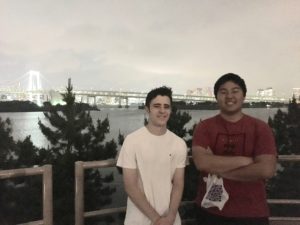
During my time in Hakodate, I often found myself wishing that America, or at least my hometown, would become more like the city of Hakodate. As I previously mentioned, Japan is almost unbelievably clean and possibly the safest feeling country I’ve ever been too. That being said, for all the good that Japan or most specifically Hakodate has, it isn’t a city without faults. As you can probably imagine, 60 students from U.S schools don’t exactly go unnoticed in a rather small fishing village where even tourism is fairly rare. Despite holding historical significance as one of the first ports opened to the U.S by Commodore Perry in the 1900’s, Hakodate has a relatively scarce amount of foreigners. To say that during our time in Hakodate, we were treated with amazing kindness wouldn’t be a lie, but at times, there definitely lingered a sense of xenophobia.
This was best described to me by a classmate of mine at Notre Dame who also participated in this program and happened to be caucasian. Though he rarely road the tram, much preferring the extensive bus system, on occasion he would humor me by coming along for the ride down the line. What he found however, in our opinion slightly humorously, was that in many cases he would find the seat(s) next to him vacant of people. In most cases, we simply chocked it up to there being extra seats available making the seats next to us insignificant. That being said, on one occasion, we found ourselves in fairly packed tram, but yet again too our surprise, the seat next to him remained vacant for the majority of the trip before it was finally occupied by an older man who was incapable of standing during the ride. In one particularly blaring incident, my friend and I boarded the tram and took two available seat, only for the passengers next to us to switch seats away from us at the very next stop. “That’s weird, that has never happened to me before, and I ride the tram everyday twice” I thought.
After some thought, it occurred to me that perhaps being Vietnamese, I simply didn’t standout as much and sure enough I found that when I sat quietly on my own the other passengers would sit next to me with little to no hesitation. In contrast, when I sat next to Alex or any other one of the other students and spoke english, the seat next to me was often left vacant in a somewhat crowded tram. But this too, befuddled me. From my understanding, in Japan, English is often seen as a pretty “cool” language. In some cases, I even found stores with nonsensical English names simply for the sake of attracting customers, and yet there we were being avoided like the plague. In their defense, there was not a single time in Japan where I felt as if anyone had an ill will towards me but this reoccurring phenomenon truly confused me. Historically of course, Japan was notoriously Xenophobic, going so far as closing the nation off, but it was my belief that with all the intertwining with american pop culture, that they became more open. In a way that may be true, as Tokyo was often filled with foreigners, and catered very much to English speaking tourist , but perhaps deep down their old beliefs still linger on?
Not satisfied with my inquires, I went to the most honest source I knew, my host family. Speaking to my Host Grandma, I learned that the xenophobic tendencies definitely exist, especially in Hakodate. In her opinion though, many of those who react distastefully to foreigners are those who have had very little interaction with them. She went on to give the example of how herself and the rest of my host family had the chance to visit Hawaii and as a result, the became more aware and interested in foreign culture and people . That made a lot of sense, especially given that the feeling was most often felt in the small city of Hakodate .
As I said, Japan is an amazing place that in my opinion is unmatched in the world when it comes to culture and environment. That being said, in this age of continued globalization, Japan too has some more growing to do.